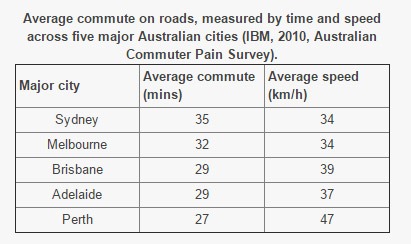The work-from-home resistance
- nk_login
- commuting, freelance, freelancing, work-from-home
- 0 Comments
In a country such as Australia where there are increasing issues with commuting, there still seems to be quite a stigma towards employees working from home. Too many people spend hours each day travelling to and from work. Daily commuting also contributes to commuters’ stress levels; consequently, extended and unpredictable trips can significantly impact a person’s psychological, emotional, and physiological wellbeing. So how is it employers don’t see the benefit of eradicating commuting and allowing their employees to work from home or alas even closer to home (in co-working venues).
A survey carried out by IBM in 2010 of 1,500 car commuters across five Australian cities (Sydney, Melbourne, Brisbane, Adelaide and Perth) aged 18-64 yearsi. The survey recorded the economic and emotional toll on commuters in each city and these results were compiled into IBM’s aptly-named Commuter Pain Index (CPI). The cities were awarded a number between 1 and 100, with 100 being the most “painful” or stressful for commuters. According to the survey, Sydney has a CPI of 40 – the highest across the Australian cities surveyed, ahead of Brisbane (34), Melbourne (32), Adelaide (22) and Perth (19)ii. Comparatively though, Australians seem to have it pretty good: on an international scale all five Australian CPI scores were considerably lower than Beijing (99), Mexico City (99) and Johannesburg (97). Perhaps these comparative result with other countries is what still holds Australian employers back from adopting more work-from-home options.

While congestion and peak hours are all part of city work life, a study from the Australia Institute shows that the daily commute contributes to commuters’ stress levelsiii. Consequently, extended and unpredictable trips can significantly impact a person’s psychological, emotional, and physiological wellbeingiii. According to the Commuter Pain study, four out of five Australians said that commuting by car was frustrating. Brisbane drivers claimed to feel the most stressed, with 90% of respondents saying that traffic increases their stress levels, followed by people in Adelaide (81%), Melbourne (78%) and Sydney (74%)i. Motorists in Perth claim to be the least stressed: only 73% of respondents reported increased stress due to traffici. I wonder if the fact that Perth is one of the lower populated cities that impacts this result.
Petrol costs in Sydney are considered lower than in many parts of the world, however once you get into the city after your long commute parking can be notoriously expensive, so what you may have saved on petrol you will pay in parking fees. If your workplace does not offer free or subsidised parking you could be looking at up to $50 (AUD) per day to park in public car parks. You can get annual or shorter term discounts if you pay in advance, but these will depend on where you want to park your car.iv
Public transport may be seem as a great alternative according to the Australia government, but overall it can be fairly unreliable and slow compared to public transport in other parts of the world. Don’t even get me started on how over-crowded some trains, buses and ferries can be during peak travelling times. If you live and work close to a train station or bus stop it is definitely is a good travel alternative, but not everyone is that fortunate. If you live more than 30 km’s away from the CBD then you can expect an average of around an hour trip each way.
In an address to the annual State of the Nation conference hosted by the Committee for Economic Development of Australia, Opposition Leader Bill Shorten referred to an estimate that traffic congestion would cost the Australian economy $53 billion by 2031. He also said the distance between where Australians live and work was growing fast and this was affecting quality of life and the amount of time families spent with each other. “Most of the new jobs are within 10 km of our CBDs. Yet most of our population growth is occurring in our outer suburbs, more than 20 km from the CBD,” he said.v
Personally I think its a no-brainer avoiding the commute into the city for work, but unfortunately many people find they feel trapped in their current job with an employer who won’t give work-from-home options a second glance. Some employers say they are open minded about flexible work environments and work-from-home options and even trial it but tend to prefer bodies in seats where they can see them to somehow prove work is being completed. Many employers just don’t know, understand or care to learn more about how to monitor and track their staff more effectively. Its hard to say whether it should be a shift in the employers and their organisations to make way for more work-from-home flexibility or whether employees should seek out jobs which allow more flexibility to slowly force those who don’t to convert.
If I was to work in the city (where most of the prominent jobs in IT industry are located) I would spend many hour commuting to and from the office to then come home being exhausted not only from work but also from the travelling (which zaps the life out of you). Instead I work close to home in a part time role as well as do some contract / freelance work from home too. I thus have more time to spend with my family, friends and time to enjoy extra curriculum activities. Working closer to home and from home has changed my life for the better.
I’ve been a professional web developer for over 15 years now and up until having my daughter (who’s now 4 years old) I could-not foresee any suitable working from home that my employers would allow. Most employers I had work for either discouraged or downright refuse work from home options, despite the fact that I could do the same job from absolutely anywhere (so long as I had a suitable internet connection).
Over 2 years ago I was referred onto my current employer through word-of-mouth as a potential developer who could help them out with various projects. My role initially started as a contractor working from home and then within 7 months I was working part time with their team and haven’t looked back since. Working part time is great because it has provided me with the flexibility of less work days per week and gaining extra one-on-one time to spend with my daughter throughout the week. To help supplement my part time salary I decided to investigate other contract and freelance options by listing myself on a few freelance communities. It wasn’t long before a new offer came my way and I was working from home again for another firm around my part time hours. The new work-from-home projects have highlighted to just how much I enjoy working from home again. Not only can I set my own work hours, my own routines and schedules, I am still local to my daughters school, able to prepare dinner for my family and find time to exercise or undertake in hobbies (such as some of my craft projects) while also making a little extra money. The extra money then isn’t sucked up by travelling expenses to and from an office, parking fees, office space hire fees or the cost of food and beverages that come unnecessarily when working in an office environment.
In the search for more opportunities I stumbled across Toptal Web Developers Community and what stood out to me most about TopTal’s website in comparison to other freelance communities is that it can be hard to find quality projects and companies to work with for a competitive salary. Most projects are either low-paying or too complex and large to be quoted on within reason to what the clients expectations are. TopTal advises that they will provide you with opportunities, so you don’t have to waste your time searching for the best projects and companies to work with. Its a win win for both TopTal clients and their freelancers!
Resources:
http://www.allianz.com.au/car-insurance/news/the-daily-battle-metropolitan-commutes
i Flickr, 2010, IBM Commuter Paid Study – Australian Index, http://www.flickr.com/photos/ibmanz/5443971761/
iii Flood, M., Barbato, C., 2005, Off to work, Discussion Paper Number 78, The Australia Institute, http://www.melbourneinstitute.com/downloads/…
iv http://sydneymovingguide.com/commuting-to-sydney/
v http://www.abc.net.au/news/2015-07-09/commuting-times-travel-shorten/6592510

